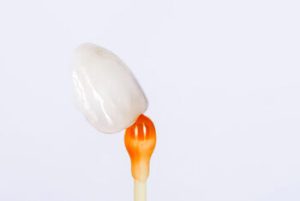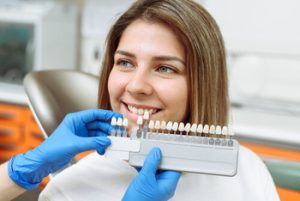When it comes to improving the appearance of your smile, dental veneers are often considered a game-changer in cosmetic dentistry. But are veneers safe for your natural teeth? With so many choices like porcelain veneers, composite veneers, and even snap-on veneers, it’s natural to have concerns about their impact on oral health. Let’s explore what makes dental veneers a safe and effective option while addressing common concerns about your natural teeth and oral hygiene.
What Are Dental Veneers?
Dental veneers are thin coverings placed over the surface of your teeth to improve their appearance. They often address issues like discoloured teeth, chipped or broken teeth, or misaligned teeth. Veneers can be crafted from different materials, such as porcelain or composite resin, and each type has its own advantages.
Porcelain veneers are esteemed for their durability and natural appearance. They are crafted in a dental laboratory, ensuring a precise fit and high-quality finish. They are resistant to stains, making them a favourable choice for those seeking a brighter smile. On the other hand, composite veneers are more economical and can be applied in a single dental procedure, though they may not last as long as porcelain.
Are Veneers Safe for Your Natural Teeth?
 Yes, veneers are generally safe when placed by a skilled cosmetic dentist. Proper dental procedures and good oral hygiene are key to ensuring their safety. When done correctly, veneers can protect the natural tooth structure underneath, providing both aesthetic and functional benefits.
Yes, veneers are generally safe when placed by a skilled cosmetic dentist. Proper dental procedures and good oral hygiene are key to ensuring their safety. When done correctly, veneers can protect the natural tooth structure underneath, providing both aesthetic and functional benefits.
However, it’s essential to understand that some enamel removal is necessary for most veneers. Porcelain and composite veneers require a thin layer of enamel to be shaved off the surface of your teeth to guarantee a proper fit. While this is minimal, it’s permanent and can cause concerns about the long-term health of your natural teeth.
Do Veneers Damage Your Teeth?
A common misconception is that veneers damage natural tooth structure. In reality, veneers do not ruin natural teeth when applied properly. The process includes removing only a thin layer of natural tooth enamel—just enough to make space for the veneer. This is usually done to a minimal extent, preserving as much of the natural tooth as possible.
The veneer procedure itself is designed to be minimally invasive. In fact, no-prep veneers require even less enamel removal, which may appeal to those concerned about damaging their teeth. However, like any dental procedure, veneers need to be maintained with proper care to avoid complications such as tooth sensitivity or issues with the underlying teeth.
What Are the Risks of Veneers?
Although veneers are generally safe, they do come with some risks, particularly if poor dental hygiene or gum disease is present before the procedure. Problems like tooth decay, tooth sensitivity, and veneer damage can occur if the patient neglects their oral hygiene.
Tooth Decay and Oral Health
If you don’t maintain good oral hygiene, you might experience tooth decay beneath the veneer. Veneers cover the front of the teeth, but the back and sides are still exposed to bacteria. This makes it essential to continue brushing, flossing, and attending routine dental exams.
Veneers and Gum Disease
Another concern is gum disease, which can arise from poor oral hygiene or improper veneer placement. To minimise the risk of complications like gum recession, it’s important to see a cosmetic dentist experienced in placing veneers.
What Types of Veneers Are Available?
Several types of veneers are designed to suit different needs and dental concerns.
Porcelain Veneers
Porcelain veneers are the most widely chosen option for improving the appearance of teeth. These highly durable veneers are custom-made in a dental laboratory. They closely mimic the appearance of natural teeth, making them a top choice for those seeking a beautiful smile.
Composite Veneers
In contrast, composite veneers are crafted from composite resin material. These can be applied directly to the teeth in one dental visit, making them a quicker and more affordable option. However, they tend to be less durable than porcelain and may require more frequent replacement.
Temporary Veneers
For those wanting to try out veneers without committing to permanent changes, temporary veneers are available. These can be removed and do not require any enamel removal, making them a non-invasive option.
How Do Veneers Affect Tooth Sensitivity?
Some patients report increased tooth sensitivity after getting veneers. This is often due to the enamel removal process. Since the thin layer of enamel removed during the procedure exposes the underlying tooth structure, you may experience temporary sensitivity to hot and cold foods. This typically subsides within a few weeks.
If sensitivity persists, it could be a sign of an issue with the veneer placement or the underlying tooth, and it’s important to consult your cosmetic dentist to ensure that there are no complications.
Are Veneers a Long-Term Solution?
When considering whether veneers are safe and effective in the long term, it’s essential to understand their durability. Porcelain veneers can endure between 10 and 15 years with proper care, while composite veneers generally last between 5 and 7 years.
The longevity of veneers depends on various factors, such as your oral hygiene routine, whether you engage in habits like teeth grinding, and the overall condition of your underlying teeth. Regular dental procedures like cleanings and check-ups play a significant role in extending the life of your veneers.
Can Veneers Prevent Other Dental Problems?
Veneers can help prevent further damage to chipped or broken teeth, providing a protective layer over the tooth surface. For patients with minor dental imperfections, veneers can act as a shield, preventing the need for more invasive dental procedures like crowns.
That said, veneers are not suitable for everyone. Individuals with severe dental problems, such as significant misalignment or decayed teeth, may require orthodontic treatments or dental crowns instead of veneers.
How to Care for Veneers
Taking care of your veneers is crucial for keeping their longevity and the health of your natural teeth. This involves practising good oral hygiene habits, including brushing and flossing on a regular basis, as well as avoiding habits like teeth grinding, which can harm your veneers and natural teeth alike. It’s also essential to visit your dentist for routine dental exams to ensure your veneers are in good condition and that no underlying issues, such as tooth decay or gum disease, have developed.
Electric Toothbrushes and Veneers
Electric toothbrushes are an ideal choice for maintaining oral hygiene, and the good news is they are safe to use on dental veneers. However, it’s essential to use them correctly to avoid damaging your veneers. Here are some tips to ensure you’re cleaning your veneers effectively and safely:
- Use a Soft-Bristled Brush Head: Opt for a brush head specifically made for sensitive teeth or veneers. Soft bristles are gentle on the veneer surface and help prevent scratches.
- Avoid Excessive Pressure: Applying extra pressure can damage both your veneers and natural teeth. Let the electric toothbrush do the work for you.
- Select a Gentle Cleaning Mode: Many electric toothbrushes come with various settings. Choose a “sensitive” or “gentle” mode to clean your veneers without causing harm.
- Be Cautious with Built-In Timers: Some electric toothbrushes have built-in timers that may not be suitable for veneers. Clean your teeth thoroughly but gently, it’s important to pay special attention to the areas where the veneers meet the gum line.
By following these guidelines, you can safely use an electric toothbrush to keep your veneers and natural teeth in excellent condition.
Pregnancy and Veneers
If you’re pregnant, you might be wondering whether it’s safe to get dental veneers. Generally, it’s recommended to wait until after pregnancy to undergo veneer procedures. Here’s why: 
- Hormonal Changes: Pregnancy causes hormonal fluctuations that can affect your gums and teeth, making it more challenging to get veneers. These changes can result in raised sensitivity and a higher risk of gum disease.
- Procedure Risks: The veneer application process involves placing a foreign material in your mouth, which can pose risks during pregnancy. It’s best to avoid any unnecessary dental procedures during this time.
However, if you already have veneers and are pregnant, maintaining good oral hygiene is crucial. Routine dental visits are key to maintaining the health and durability of both your veneers and natural teeth. Always consult with your dentist to address any concerns you may have during pregnancy.
Common Concerns and Misconceptions
There are many common concerns and misconceptions about dental veneers that can cause confusion. Let’s address some of these to help you make an informed decision:
- Suitability: Veneers are not suitable for everyone. Individuals with severe gum disease or significant tooth decay may need to handle these issues before considering veneers. A comprehensive dental examination will help determine if veneers are right for you.
- Permanence: While veneers are durable, they are not a permanent solution. Porcelain veneers often last between 10 to 15 years, and composite veneers typically last 5 to 7 years. Eventually, they may need to be replaced.
- Functionality: Veneers are not just for cosmetic purposes. They can also repair damaged teeth and improve the function of your teeth. For example, veneers can protect chipped or broken teeth and enhance your bite.
- Pain: The veneer application process is generally manageable. Dentists use local anaesthesia to numb the area, ensuring you’re comfortable throughout the procedure. Most patients report minimal discomfort during and after the process.
By understanding these facts, you can confidently decide whether dental veneers are the right choice for enhancing your smile and oral health.
Veneers vs Other Cosmetic Dentistry Options
Veneers are one of many options available in cosmetic dentistry. If you’re considering veneers, it’s essential to weigh their benefits against other procedures, such as teeth whitening, dental implants, or orthodontic treatments.
Teeth Whitening vs Veneers
For those with discoloured teeth, teeth whitening can offer a quick and non-invasive solution. However, whitening doesn’t address other cosmetic concerns like chipped teeth or misaligned teeth. Veneers can provide a more comprehensive solution for those looking to improve multiple aspects of their smile.
Dental Crowns vs Veneers
If a tooth is significantly damaged, a dental crown might be a more suitable choice than a veneer. Crowns cover the entire tooth and offer more protection than a veneer, making them ideal for cracked teeth or teeth that have undergone a root canal.
Veneers and Orthodontic Treatments
If you have misaligned teeth or severe dental issues, orthodontic treatments like metal braces or Invisalign may be necessary before getting veneers. Veneers can only address minor dental imperfections, so they may not be suitable for everyone.
The Veneer Application Process
Getting dental veneers involves several steps, each crucial for achieving a natural and long-lasting result. Here’s a breakdown of what you can expect during the veneer application process:
- Consultation: Your journey starts with a consultation with a cosmetic dentist. During this visit, you’ll discuss your goals, and the dentist will decide if veneers are the right option for you.
- Preparation: To prepare your teeth for veneers, the dentist will remove a small amount of tooth enamel from the front surface of your teeth. This step is crucial for ensuring a proper fit and natural appearance.
- Impressions: Your dentist will take moulds of your teeth to create an accurate model of your mouth. These moulds are then sent to a dental lab, where your custom veneers will be carefully made.
- Veneer Creation: Using the impressions, skilled technicians in the dental laboratory will create your veneers. This process ensures that the veneers match your natural teeth’ shape, size, and colour.
- Bonding: Once your veneers are ready, the dentist will attach them to your teeth using a specific dental adhesive. This step requires precision to ensure the veneers fit perfectly and look natural.
- Adjustment: After bonding, the dentist will make any needed adjustments to the veneers to guarantee a comfortable and proper fit. You may need to use temporary veneers while waiting for your permanent ones.
The entire process typically spans several appointments, but the result is a beautiful, natural smile that can last for years with good care.
Final Thoughts: Are Veneers Safe?
 In summary, dental veneers are generally safe when applied by a qualified cosmetic dentist and when you maintain a good oral hygiene routine. While they do require some enamel removal, the risks to your natural tooth structure are minimal when proper care is taken. With advances in dental technology and a wide variety of veneer options available, you can confidently enhance the appearance of your teeth while protecting your oral health.
In summary, dental veneers are generally safe when applied by a qualified cosmetic dentist and when you maintain a good oral hygiene routine. While they do require some enamel removal, the risks to your natural tooth structure are minimal when proper care is taken. With advances in dental technology and a wide variety of veneer options available, you can confidently enhance the appearance of your teeth while protecting your oral health.
Whether you decide on porcelain or composite veneers, the key to veneer success lies in ongoing care and regular visits to your dentist. A brighter smile is within reach, and with veneers, you can achieve it safely and effectively.
For any veneer inquiries or to explore whether veneers are right for you, contact Beyond Infinity Dental at (02) 8806 3799 to discuss the best option that matches your needs and dental health.
References:
- Cleveland Clinic. (n.d.). Dental veneers. https://my.clevelandclinic.org/health/treatments/23522-dental-veneers
- NHS. (n.d.). Orthodontics. https://www.nhs.uk/conditions/orthodontics/
- Mayo Clinic. (n.d.). Sensitive teeth: What treatments are available? https://www.mayoclinic.org/healthy-lifestyle/adult-health/expert-answers/sensitive-teeth/faq-20057854
- News-Medical. (n.d.). Dental veneers procedure and safety. https://www.news-medical.net/health/Dental-Veneers-Procedure-and-Safety.aspx#:~:text=In%20this%20procedure%2C%20minimal%20enamel,the%20final%20veneer%20is%20received
- 5. Natrusmile. (n.d.). What are temporary veneers? https://www.natrusmile.com/blogs/news/what-are-temporary-veneers









